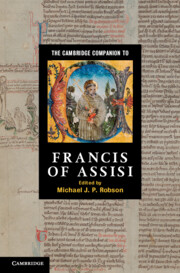Book contents
- Frontmatter
- Introduction
- PART I Francis of Assisi
- PART II The heritage of Francis of Assisi
- 10 Francis and the pursuit of learning
- 11 The early Franciscans and the towns and cities
- 12 The Third Order of Francis
- 13 Franciscan ideals and the royal family of France (1226–1328)
- 14 Franciscans as papal and royal envoys to the Tartars (1245–1255)
- 15 Franciscan missions
- 16 Pope John XXII, the Franciscan order and its Rule
- 17 The ecumenical appeal of Francis
- A guide to further reading
- Index
16 - Pope John XXII, the Franciscan order and its Rule
from PART II - The heritage of Francis of Assisi
Published online by Cambridge University Press: 28 November 2011
- Frontmatter
- Introduction
- PART I Francis of Assisi
- PART II The heritage of Francis of Assisi
- 10 Francis and the pursuit of learning
- 11 The early Franciscans and the towns and cities
- 12 The Third Order of Francis
- 13 Franciscan ideals and the royal family of France (1226–1328)
- 14 Franciscans as papal and royal envoys to the Tartars (1245–1255)
- 15 Franciscan missions
- 16 Pope John XXII, the Franciscan order and its Rule
- 17 The ecumenical appeal of Francis
- A guide to further reading
- Index
Summary
The Rule and life of the Friars Minor is this: to observe the Holy Gospel of Our Lord Jesus Christ by living in obedience, without anything of one’s own, and in chastity.
(RB, I)Roughly a century after the approval of the Franciscan Rule by Honorius III, members of the order claimed that a pope was trying to destroy it. For an order previously so dependent on the papacy for protection, patronage and privileges, this was a remarkable volte-face. Blame for the alienation of affection is invariably directed at Pope John XXII (1316–34): several medieval Franciscan sources portray John as a heretic, and historians have followed suit in casting the pope as an enemy of the order, like William of Saint-Amour, a Parisian master of theology very critical of the theological basis for the pastoral role played by the mendicants. But to style John as the architect of an attack against Franciscans obscures the fact that the pope's actions were fundamentally reactions – responses to legal appeals and supplications from the friars themselves, who, as ever, looked to the papacy to solve their problems. John's reform of the Franciscan order was fitful, piecemeal and unplanned.
John XXII began his pontificate by honouring the order in canonising a friar, Louis of Toulouse (d. 1297). The canonisation bull, Sol oriens (April 1317), reveals the pope's benign disposition towards the Franciscans. John praised Louis's poverty: his moderate use of goods necessary for the exercise of the episcopal office, his love for the poor and his wearing a ‘shabby’ (vilis) habit in observance of the Rule. Poverty was praiseworthy and unproblematic: in no way was it a source of conflict or controversy. Before becoming pope, John had been associated with Louis's family, the Angevin rulers of Naples. He was elected on 7 August 1316, two years after the death of Clement V (1305–14).
- Type
- Chapter
- Information
- The Cambridge Companion to Francis of Assisi , pp. 258 - 272Publisher: Cambridge University PressPrint publication year: 2011

